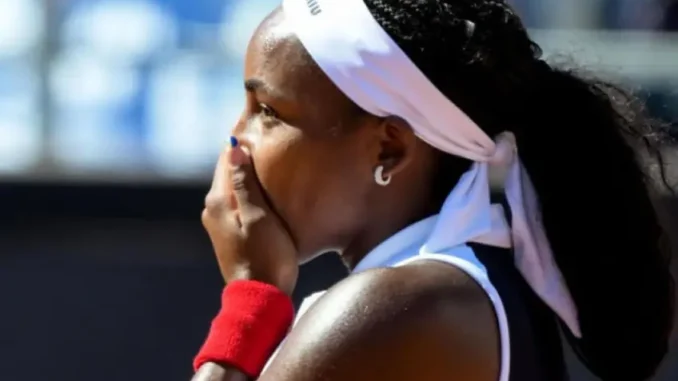
The air was thick with anticipation in Rome as the Italian Open final loomed, featuring local favorite Jasmine Paolini and the American phenom Coco Gauff. While the crowd was undeniably in Paolini’s corner, former World No. 1 Andy Roddick offered a fascinating insight into Gauff’s approach, suggesting that the young American had consciously chosen not to overtly engage with the passionate Italian faithful, perhaps to avoid inadvertently fueling their support for her opponent.
Roddick, known for his sharp analytical mind, observed Gauff’s demeanor during the match against Paolini. He surmised that Gauff, a Grand Slam winner and a top-ranking player, operates under immense pressure. Her strategic containment of emotions during matches, particularly evident in Rome, aimed to neutralize the influence of the home crowd. It was a subtle yet significant tactical decision in a high-stakes environment.
The final itself saw Paolini claim a decisive victory, 6-4, 6-2. Gauff’s performance, while generally solid throughout the tournament, was hampered by a noticeable dip in her service game. She tallied a significant number of double faults, particularly in the opening set, which provided crucial inroads for Paolini. The Italian, in contrast, was firing on all cylinders, showcasing her improved game and feeding off the fervent energy of the crowd.
Tennis legends Jim Courier and Andy Roddick were quick to dissect Gauff’s unexpected loss, highlighting her forehand as a major concern. Courier noted Gauff’s visible frustration with her team, likely exacerbated by the noisy atmosphere. He pointed out the astonishing statistic of 33 unforced errors from Gauff’s forehand alone. “You would need a real big shovel to fill that hole in,” Courier remarked, emphasizing the severity of the issue at such a critical juncture. He further expressed surprise at how easily the second set unfolded for Paolini, given Gauff’s renowned resilience throughout the Madrid and Rome tournaments.
Roddick echoed these sentiments, stressing that the forehand, a stroke frequently discussed in Gauff’s game, “is always going to be in the back of her head until it’s not.” He articulated his belief that Gauff needs to be aggressive with her forehand early in matches. However, if that aggression leads to mounting errors, he suggested a different approach: “I actually think the opposite, if she’s if she’s not finding it early, there’s just not a world where she can get to 33 errors on that side in two sets, right? I actually think it goes the other way. I think she should be aggressive early, and then if it’s not there and the errors are mounting, I think she has to just use her motor, right, use her legs to try to find herself in the match. She kind of made it a little bit easier for Paolini.”
Paolini’s strategic brilliance was also lauded. Roddick commended the Italian for her astute decision-making, highlighting how she “never hits a shot where I’m like, “Woof, that was a wrong choice.” She might get beat. She’s like, she always hits the right shot.” This intelligence on court, coupled with her ability to exploit Gauff’s weaknesses, was a significant factor in her triumph. Paolini’s pressure on Gauff’s forehand, in particular, set the pace of the match, forcing Gauff out of her preferred backhand-to-backhand rallies.
Despite the Rome setback, Gauff remains resolute. Having reached the finals in both Madrid and Rome, she has shown a resurgence on the European clay swing. While acknowledging the highs and lows inherent in a long tennis season, Gauff maintains her focus on Grand Slams rather than rankings. “I’ve never been a rankings girl,” she stated, reiterating a long-held philosophy from her father: “the number, the ranking will come with the Slams.” Her ultimate satisfaction, she insists, lies in accumulating major trophies.
As Gauff now prepares for the French Open, where she was a finalist in 2022, the lessons from Rome will undoubtedly serve as crucial preparation. The mental fortitude and tactical adjustments discussed by Roddick and Courier will be paramount if she is to overcome her serving woes and forehand inconsistencies. Her journey to the French Open will be a test of her ability to learn from defeats and channel her unwavering determination into Grand Slam success.
Leave a Reply